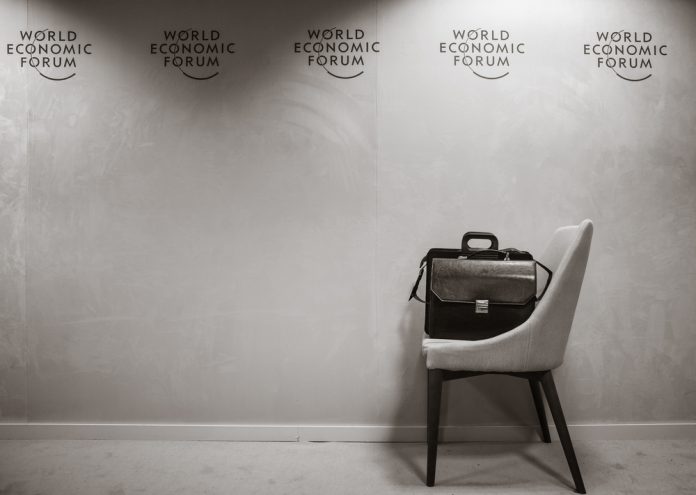
The annual meeting in the Swiss mountain resort of Davos from Jan. 22 to 25, attended by business leaders, politicians, and economists is in progress. Cryptocurrency is once again on the agenda, but so far the discussions emerging from the conference have been mixed, giving attendees plenty of FUD for thought.
Also Read: George Soros: Bitcoin Is Propped Up by Dictators
Cryptocurrencies on the Agenda at Davos
 This year many high profile government representatives dropped out from attending the Davos conference aimed at the global elite. President Donald Trump canceled his trip due to the ongoing government shutdown, French president Emmanuel Macron said he would not attend after weeks of protests in France, and U.K. prime minister Theresa May pulled out due to the complications caused by Brexit.
This year many high profile government representatives dropped out from attending the Davos conference aimed at the global elite. President Donald Trump canceled his trip due to the ongoing government shutdown, French president Emmanuel Macron said he would not attend after weeks of protests in France, and U.K. prime minister Theresa May pulled out due to the complications caused by Brexit.
Despite the high profile dropouts the show, must go on. Delegates at the Swiss resort have been busy discussing major issues around crypto. Bloomberg TV reports that Huw van Steenis, senior advisor to Bank of England Governor Mark Carney, said: “Cryptocurrencies fail fundamental tests of financial services.”
During a CNBC hosted panel, Jeff Schumacher, founder of BCG Digital Ventures, said: “I do believe it [bitcoin] will go to zero. I think it’s a great technology but I don’t believe it’s a currency. It’s not based on anything.”
Cryptocurrency Representatives Keep a Low Profile
From the conference, Angel Versetti, CEO of decentralized internet of things network Ambrosus, told news.Bitcoin.com there is a general sentiment of uncertainty and worry in the air, with broader menacing macro-trends indicating a potential looming global crisis not only economically, but also politically across different zones.
Compared to Davos 2018, many crypto delegates are keeping a low profile this year. Versetti said: “Already, almost every one of the great powers has canceled their attendance; heads of state from Russia, China, America, France, the UK, and India all opted not to attend. In general everything is toned down compared to last year.”
In 2018 we witnessed economic growth and the World Economic Forum (WEF) took place when cryptocurrencies were close to their peak value. Versetti said:
While last year, people were talking about crypto and blockchain anywhere and everywhere, this year there is comparatively little discussion around it.
 Another observation made at Davos on Jan. 23 is that the flagship flashy crypto pavilions of last year, such as Consensys and Global Blockchain Council, have become much more modest and low profile.
Another observation made at Davos on Jan. 23 is that the flagship flashy crypto pavilions of last year, such as Consensys and Global Blockchain Council, have become much more modest and low profile.
“One can feel the crypto crisis there, because the pavilions are never full and most guests are from the crypto space itself, rather than from other industries. As the 1 percent continue to go back and forth on their position on crypto, big bankers’ skepticism on the role of cryptocurrencies in finance is unwavering. Some crypto events even shut down their pavilions and canceled their participation altogether,” said Versetti.
Some attendees are remaining positive despite all the doom and gloom talk at Davos. Michael Sung, a technology investor and co-director of the fintech research center, told news.Bitcoin.com: “This year crypto will finally get grow up and get real, where the technology, business models, traction across industries, and regulation are all simultaneously maturing to enable practical enterprise applications. We are waking up from a crypto hangover where undisciplined unenthusiasm of last year will lead to better behavior which will drive the industry into professionalism such that institutional participation will be possible.”
More Balanced Panels and Views Shared
One key panel at Davos, called Building a Sustainable Crypto-Architecture, was more interesting as it featured a range of balanced views. The panel pitted well-known Bitcoin skeptics Gillian Tett from the FT and Ken Rogoff from Harvard against the founders of Circle, which is backed by Goldman Sachs and Bitpesa.
As the Building a Sustainable Crypto-Architecture panelists noted, it’s likely that regulation of the cryptocurrency space will increase. Regardless of the stance that lawmakers take, this much is for certain: business leaders will continue to flock to Davos every year and the vast majority will continue to be badly wrong about Bitcoin.
What are your thoughts on Davos and the leaders who attend the conference? Let us know in the comments section below.
Images and video courtesy of Shutterstock of World Economic Forum.
Need to calculate your bitcoin holdings? Check our tools section.
The post Davos 2019: Leaders Share Mixed Cryptocurrency Predictions appeared first on Bitcoin News.
Powered by WPeMatico
